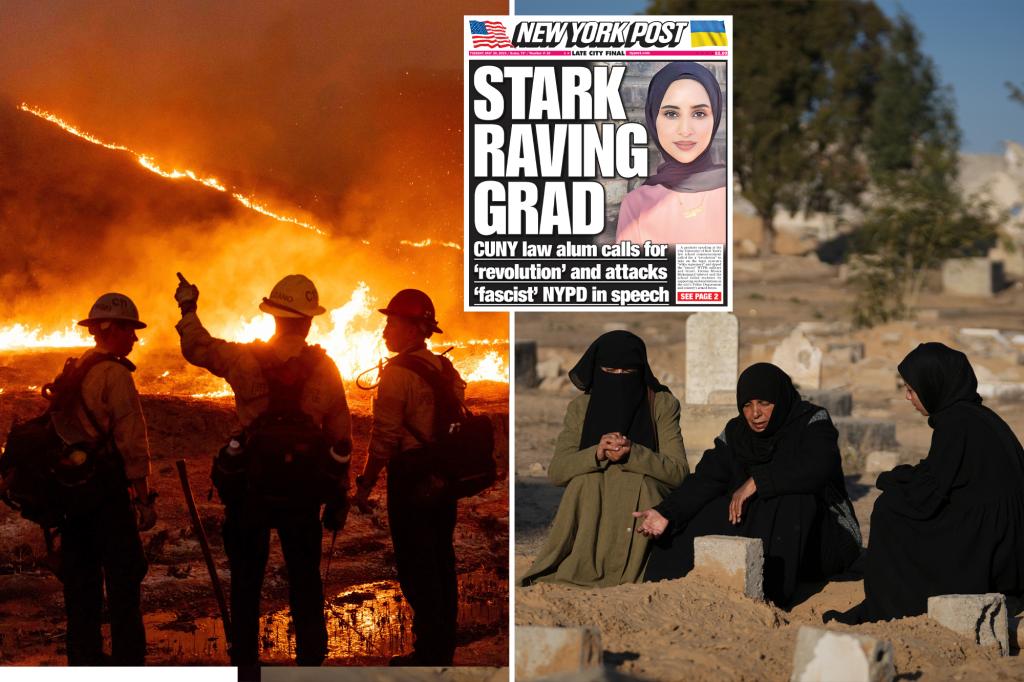Fatima Mousa Mohammed, a recent graduate of the City University of New York (CUNY) Law School, ignited controversy with her commencement speech in May 2023, which was marked by strong anti-Israel sentiment and calls for revolutionary change. Her speech, delivered on May 12th, garnered widespread attention and criticism, landing her on the front page of the New York Post with the headline “Stark Raving Grad.” Mohammed’s address condemned the legal system as inherently rooted in white supremacy, labeled city police and the US military as fascist, and vehemently denounced Zionism. This speech sparked outrage from various community leaders and political figures, including New York City Mayor Eric Adams.
Mohammed’s controversial pronouncements resurfaced in the wake of devastating wildfires that swept across Los Angeles in late 2023, causing widespread evacuations and destruction. In a series of posts on X (formerly Twitter), Mohammed attributed the California wildfires to Israel’s actions in Gaza. She argued that the extensive bombing campaigns in Gaza, which she described as turning the region into a “blazing inferno,” have far-reaching consequences that extend beyond moral condemnation and directly impact the global climate. She posited a causal link between the conflict in Gaza and the environmental disaster unfolding in California, presenting it as a manifestation of the interconnectedness of global events.
Mohammed’s assertions centered on the concept that actions in one part of the world, particularly acts of aggression and violence, have ripple effects that can manifest in environmental calamities elsewhere. She contended that ignoring the “rain of fire” funded in regions like Gaza would inevitably lead to a worsening climate crisis, fueled by global complacency. Her rhetoric emphasized the interconnectedness of seemingly disparate events, portraying the California wildfires as a direct consequence of the conflict in Gaza.
Mohammed’s fiery rhetoric continued with an ominous warning about the expanding reach of the consequences she attributed to the Gaza conflict. She declared that the “flames of Gaza” would not be contained and would eventually impact everyone if left unchecked. She used the phrase “eye of the empire” to suggest a broader geopolitical context, implying that the consequences of conflict and oppression are not limited to specific geographic locations but will ultimately affect all those who are complicit in or indifferent to such actions. This rhetoric further solidified her stance on the interconnectedness of global events and the potential for localized conflicts to have widespread repercussions.
The controversy surrounding Fatima Mousa Mohammed highlights the complex interplay between political activism, social commentary, and environmental concerns. Her pronouncements linking the California wildfires to the Israeli-Palestinian conflict sparked heated debate and further polarized opinions. Critics argued that her claims were baseless and inflammatory, diverting attention from the immediate causes of the wildfires and exploiting a natural disaster for political purposes. They accused her of using emotionally charged language and unsubstantiated connections to promote her anti-Israel agenda.
Conversely, supporters of Mohammed’s perspective viewed her statements as a reflection of the interconnected nature of global events and the far-reaching consequences of conflict. They argued that her rhetoric sheds light on the often-overlooked environmental impact of military actions and the broader implications of geopolitical tensions. This perspective emphasizes the need to consider the environmental consequences of conflict and to address the root causes of instability that can contribute to both human suffering and environmental degradation. The controversy surrounding Mohammed’s statements underscores the challenges of navigating complex political and environmental issues in an increasingly interconnected world.

